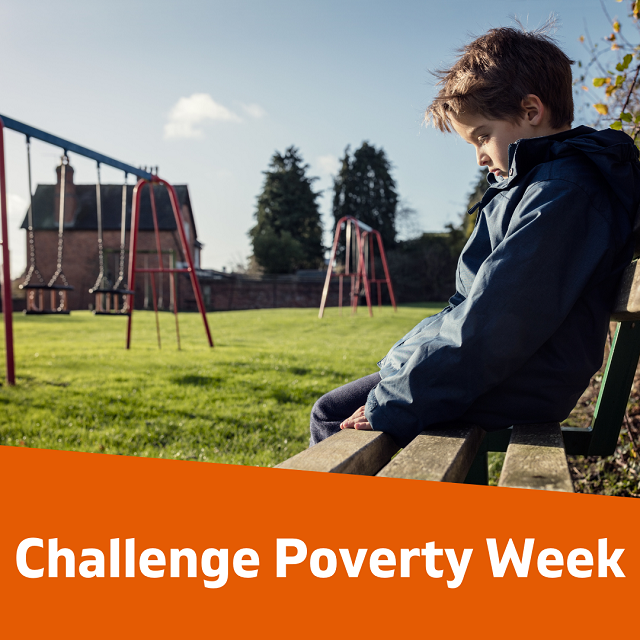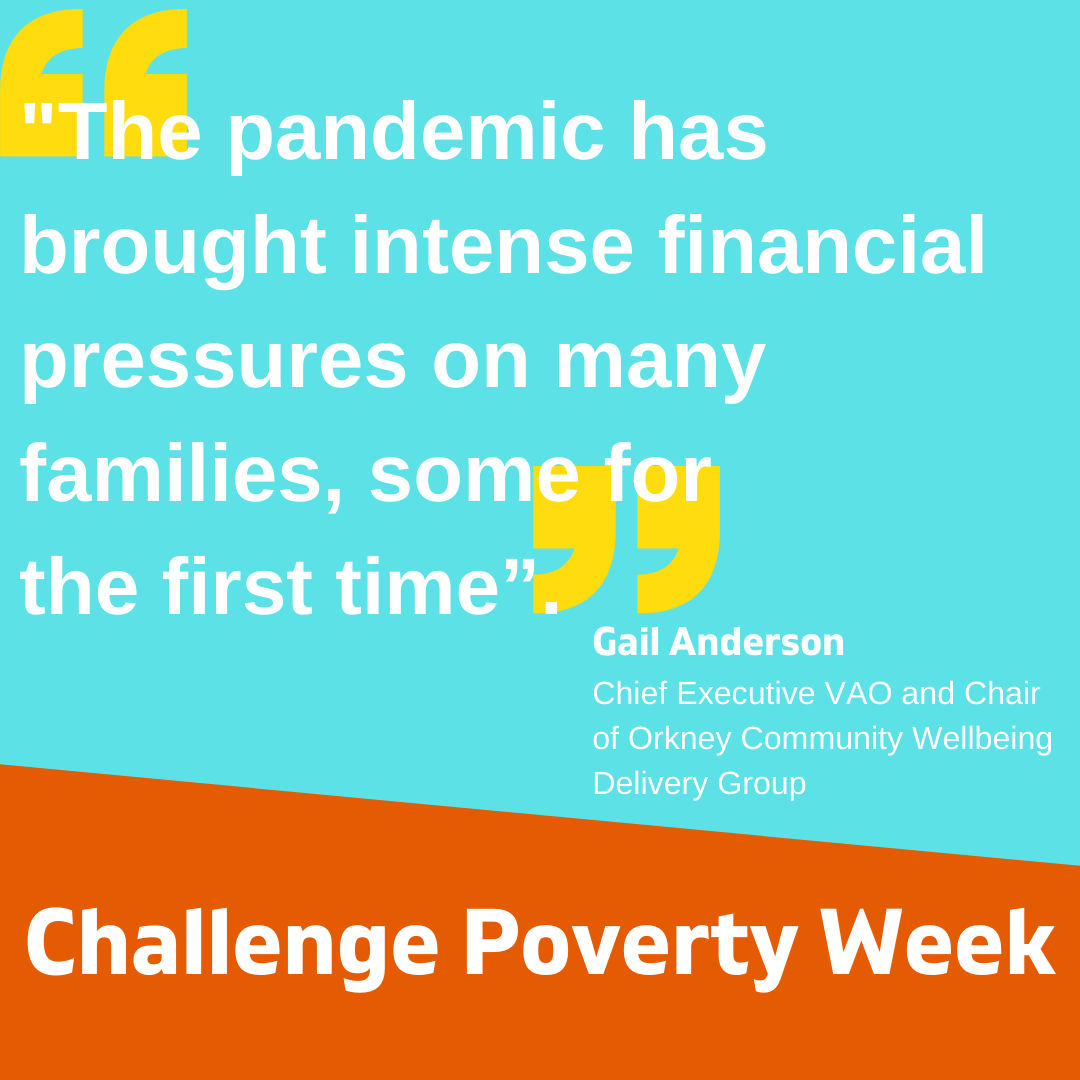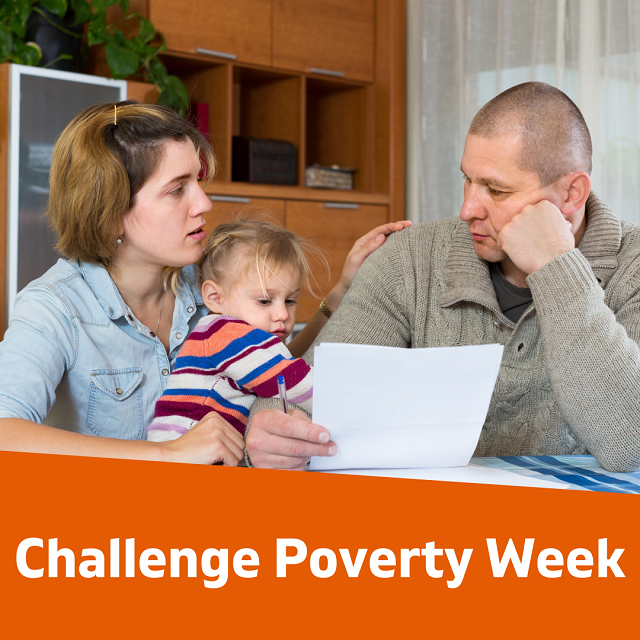Challenge Poverty Week - let's talk about making ends meet during COVID-19
Date: 29 September 2021

Challenge Poverty Week, 4-10 October 2021
This Challenge Poverty Week, Orkney’s Child Poverty Task Force is asking the community to reflect on what being poor really means to local families as the COVID-19 pandemic continues, and actions we can all take to help reduce stigma and bring about change.
Challenge Poverty Week: 4-10 October 2020, a Scotland-wide event run by the Child Poverty Action Group (CPAG), is aimed at raising awareness about disadvantage and helping end the stigma of living on a low income.
Gail Anderson is Chair of Orkney’s Community Wellbeing Delivery Group, set up by the Orkney Partnership - the county’s statutory community planning body - to support Orkney’s individuals and communities to withstand and recover from the Covid-19 pandemic and its socio-economic impacts. A priority of The Orkney Partnership is to raise awareness of and work to alleviate poverty.
Well known in the Orkney community as Chief Executive of Voluntary Action Orkney, Gail says the time is right to focus on Challenge Poverty Week to inspire change to help address increasing issues of hardship for children and their families:
“Despite Orkney traditionally having one of the lowest unemployment rates in the UK, we still have many families living on low incomes.
“And the pandemic has brought to bear intense financial pressures on many families, some for the first time.
“There has therefore never been a better time for us, as a community, to rethink what we mean by poverty and reframe it in a more useful way, with less stigma attached, so that families who are struggling to enjoy life due to financial worries feel they can seek support.”
 Jim Lyon is Chair of the Orkney Partnership’s Child Poverty Task Force – a short term working group focussing in on stemming the impact of disadvantage on young people - and Interim Chief Social Work Officer for Orkney Islands Council and Orkney Health and Care. He says it’s vital we all reframe how we think about poverty - “It’s so important to do this, because ideas of poverty based on extreme images of homelessness and destitution don’t really paint the true picture and they don’t help families in need.
Jim Lyon is Chair of the Orkney Partnership’s Child Poverty Task Force – a short term working group focussing in on stemming the impact of disadvantage on young people - and Interim Chief Social Work Officer for Orkney Islands Council and Orkney Health and Care. He says it’s vital we all reframe how we think about poverty - “It’s so important to do this, because ideas of poverty based on extreme images of homelessness and destitution don’t really paint the true picture and they don’t help families in need.
“Disadvantage is not just about empty wallets – it is also about children feeling left out and left behind and the lasting impact that has on their wellbeing and that of their families.”
The Joseph Rowntree Foundation – a UK charity with a mission to inspire action and change to end poverty in the UK says society’s definition of poverty needs to include an understanding of the effects and impacts of poverty beyond financial security:
“Poverty means not being able to heat your home, pay your rent, or buy the essentials for your children. It means waking up every day facing insecurity, uncertainty, and impossible decisions about money. It means facing marginalisation – and even discrimination – because of your financial circumstances. The constant stress it causes can lead to problems that deprive people of the chance to play a full part in society.”
Jim points to this simple statement by the national Child Poverty Action Group charity: “A child can have three meals a day, warm clothes and go to school, but still be poor because her parents don’t have enough money to ensure she can live in a warm home, have access to a computer to do her homework, or go on the same school trips as her classmates.”
Jim added: “We have an opportunity now to raise awareness and start conversations in Orkney that will help inform and deliver child poverty work over the next two years.”
Jim says there are some particular reasons Orkney families are vulnerable to increasing levels of hardship as the pandemic goes on:
“There is a perception Orkney is an idyllic place to live and bring up children and for many, it is. However, we cannot shy away from an undercurrent of poverty which may be less visible than in many other areas. It exists and is rising, according to the research.
“The lack of visible poverty makes it difficult to evaluate the true nature of the challenges affecting children and families in Orkney and impacts on the effectiveness of the policy and practice necessary to address them.
“There are unique challenges in the islands, rural households face an increased cost of living of between 10% to 30% more than children and families living in urban Scotland and this premium is even higher in the smaller isles.
“It is the nature of Orkney’s high level of micro-businesses, fishing and farming that household income can be uneven and unpredictable."
The Child Poverty Task Force is calling on local people and organisations to talk about disadvantage – both to raise awareness and to reduce stigma. To do this, the group is setting out some facts about disadvantage in Orkney.
It’s hoped this will help people consider how the everyday activities and services they use or run could evolve to take account of the struggles local families are facing and eliminate stigma for children.
Facts (evidence taken from the draft Orkney Child Poverty Strategy):
- There are about 500-700 children in low income families in Orkney right now.
- Working families experience poverty too. About 2/3 of those in poverty in Orkney– about 230 children – are in households where at least one parent works.
- Blaming people in poverty for their own disadvantage is unfair and inaccurate: low income leaves households with children in poverty, whether they are working or on benefits, whether they are in households with one parent or two.
- Much poverty is hidden – people don’t want to say things are difficult because they feel ashamed… even though it isn’t their fault.
- When a child can’t join in with classmates on a trip, or contribute to an activity, they can experience shame and isolation, which affects their social interactions and learning. This shame can last a lifetime.
- Many agencies in Orkney work to help families in poverty. Life for those families has become more difficult during the pandemic, with less work available, and greater need. And the organisations themselves are under more pressure.
Jim says: “We want people to start a conversation with their friends, family, workplaces, sporting clubs and community groups. This can be as simple as saying:
- Did you see that about Child Poverty this week?
- I read that about 700 children in Orkney live in poverty, without the warm home, good food and resources other children have…
- Some children don’t get to do normal things like go to the chippy… that’s shocking!
- Our group asks for a fee each term – I wonder if that stops some families being able to join?
- Childhood disadvantage doesn’t stop if a family suddenly gets more money, or when a young person leaves home – it affects people throughout their lives… so children need our help now…
- Imagine what it’s like for parents… it must be so hard to keep going when life is so difficult and there’s no-one to talk to.
- It must feel awful for a child who’s unable to take part in activities or opportunities…
Or, if someone says to you they feel lucky they’re not in poverty, but things are “just a bit hard at the moment", say "How you do know you’re not disadvantaged? Why not check out the survey? And maybe find out what help there is?"
“Perhaps most importantly, we’re asking people experiencing hardship to complete our “Making Ends Meet” survey and tell us the ways in which disadvantage is affecting you.”
 James Stockan is Leader of Orkney Islands Council and Chair of the Orkney Partnership: “We’d urge local people who are struggling and worried about the impact of the current climate on their household and their children to engage with this survey.
James Stockan is Leader of Orkney Islands Council and Chair of the Orkney Partnership: “We’d urge local people who are struggling and worried about the impact of the current climate on their household and their children to engage with this survey.
“The insights of local families will help the county’s agencies and organisations better support children and households in difficulty to enjoy life and see hope for the future.”
There will be some families who are struggling who do not think they are in poverty due to perceived ideas surrounding what poverty is. Poverty comes in all shapes and forms, and these are difficult times. Even if you are not sure about your circumstances there are organisations on hand to help - a PDF directory can be accessed via the Orkney Partnership website.
- Summary:
This Challenge Poverty Week, Orkney’s Child Poverty Task Force is asking the community to reflect on what being poor really means to local families as the COVID-19 pandemic continues, and actions we can all take to help reduce stigma and bring about change.
- Category:
- Covid-19
- Orkney Health and Care
- Consultations
- External Link:

